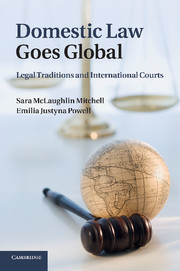Book contents
- Frontmatter
- Contents
- List of figures
- List of tables
- List of boxes
- Acknowledgments
- List of acronyms
- 1 The creation and expansion of international courts
- 2 Major legal traditions of the world
- 3 A rational legal design theory of international adjudication
- 4 Domestic legal traditions and the creation of the International Criminal Court
- 5 Domestic legal traditions and state support for the World Court
- 6 The rational design of state commitments to international courts
- 7 The consequences of support for international courts
- 8 Conclusion
- References
- Index
5 - Domestic legal traditions and state support for the World Court
Published online by Cambridge University Press: 21 April 2011
- Frontmatter
- Contents
- List of figures
- List of tables
- List of boxes
- Acknowledgments
- List of acronyms
- 1 The creation and expansion of international courts
- 2 Major legal traditions of the world
- 3 A rational legal design theory of international adjudication
- 4 Domestic legal traditions and the creation of the International Criminal Court
- 5 Domestic legal traditions and state support for the World Court
- 6 The rational design of state commitments to international courts
- 7 The consequences of support for international courts
- 8 Conclusion
- References
- Index
Summary
For nearly ninety years, a World Court (PCIJ, 1920–1945; ICJ, 1946–present) has been accessible to all countries for the peaceful settlement of disputes. However, initial hopes that states would view the Court as a legitimate and effective conflict manager have not been fully realized. Only one third of countries in the world accept the compulsory jurisdiction of the Court, and an overwhelming majority of these states (84 percent) place reservations on their optional clause declarations, which can limit the Court's adjudication prerogatives. On the other hand, it is much more common for states to recognize the PCIJ/ICJ's jurisdiction through compromissory clauses in bilateral or multilateral treaties. For example, close to 80 percent of countries in the world are signatories to one or more treaties that recognize the Court's jurisdiction should a dispute arise in the context of the treaty (Powell and Mitchell 2007).
In this chapter, we explore states' decisions to recognize the jurisdiction of a pre-existing international court to adjudicate interstate disputes. Why do some states accept the jurisdiction of an international court, like the ICJ, while other states do not? How do expectations about international bargaining influence unilateral state decisions to accept or not accept the jurisdiction of an international court? In Chapter 3, we linked characteristics of domestic legal families (civil law, common law, and Islamic law) to our rational legal design theory of adjudication, which focuses on how adjudicators can help disputants resolve coordination problems by correlating strategies, constructing focal points, and signaling information.
- Type
- Chapter
- Information
- Domestic Law Goes GlobalLegal Traditions and International Courts, pp. 129 - 163Publisher: Cambridge University PressPrint publication year: 2011



